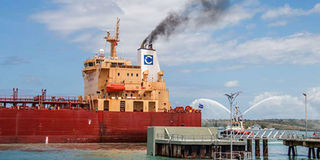First oil export to net Sh1.2bn amid profit-sharing queries

Alpine Loyalty tanker transports Kenya’s first consignment of crude oil from Mombasa to Malaysia on August 26, 2019. President Uhuru Kenyatta pledged that the country’s oil windfall would be put to good use. PHOTO | COURTESY
What you need to know:
- The government is committed to supporting the modification of the Petroleum Refinery Limited to support the early pilot oil scheme.
- Ministry of Petroleum adviser Brian Muriuki said Kenyans would realise the benefits of oil beginning in 2022 as the area being explored is not viable at the moment.
As the Alpine Loyalty (MV Celsius Riga) tanker docks at the Malaysian port of Dickson at 8pm on September 10 with Kenya’s first consignment of 200,000 barrels of crude oil, expectations back home will be that the Sh1.2 billion earned from the black gold will mark the beginning of a change in fortunes for the world’s newest exporter.
On Monday, President Uhuru Kenyatta, flagging off the Marshall Island-registered vessel, pledged that the country’s oil windfall would be put to good use.
“We will ensure that Kenya’s natural resources are utilised in a manner that yields maximum dividends today, but without compromising the interest of future generations,” the President said.
The tanker immediately set sail for Port Dickson to deliver the consignment to its Chinese buyer, ChemChina UK Ltd, the oil-trading arm of ChemChina (China National Chemical Corporation) Petrochemical, which is engaged in crude oil trading, storage and procurement for ChemChina’s refinery companies.
“This event marks a special history for us. While initial attempts were unsuccessful, Kenya’s potential for oil and gas had been established. I’m proud to say our grand march to oil and gas export has now begun and the flagging off of this consignment represents a new dawn not just for Kenya, but also for our region; and a beginning of a new era of prosperity for all Kenyans,” President Kenyatta said.
REVENUE SHARING
But even as the shipment made its way to Malaysia, leaders at the function were calling for equitable sharing of oil proceeds.
The oil had been stacked at the Kenya Petroleum Refineries Ltd's storage facilities in Changamwe, Mombasa, having been transported by road from Turkana County.
“We understand [that], right from Turkana to Mombasa, different people have contributed to ensure we make the first export today. And I ask for equitable sharing of resources according to our laws. We also have to reinvest the proceeds in infrastructure to improve lives of Kenyans,” said the President.
The President was reacting to governors Hassan Joho (Mombasa), John Lonyangapuo (West Pokot) and Salim Mvurya (Kwale) and Turkana Deputy Governor Peter Lotethiro, who called for the implementation of the Mining Act (2016) that outlines how resources accrued from minerals and petroleum should be shared.
OIL PIPELINE
The crude oil export still leaves many questions unanswered. It is not clear how the country will benefit as there is no public production sharing contract stipulating how the Sh1.2 billion will be shared between the Kenyan government and the Joint Venture Partners.
The 2019 Petroleum Act provides for profit-sharing between the national government (75 per cent), county government (20 per cent) and the local community (five per cent), but the amount to be shared will only be known after the cumulative cost of the Early Oil Pilot Scheme (EOPS) is known and a formula agreed on how the cost will be recovered.
The President said the government is committed to supporting the modification of the Petroleum Refinery Limited to support the early pilot oil scheme as the construction of the 890-kilometre pipeline from Lokichar to Lamu is being initiated to ease transportation of the oil, which is currently being ferried using trucks.
The National Land Commission has already embarked on land surveys following the completion of the Front End Engineering Design study for the Sh210 billion pipeline.
COMMERCIAL VIABILITY
Tullow Oil Chief Executive Officer Paul McDade said the company had invested more than Sh300 billion in the project and it intends to make the first commercial sale in 2022.
“Since we discovered oil in Turkana, we have spent billions of shillings in the EOPS, but we hope to make more investments. And with the completion of Lamu Port, it would make our export and operations cheaper,” said Mr McDade, adding that this shipment was the first under EOPS and trucking will continue for the next 18-24 months.
“For Project Oil Kenya, the Kenya Joint Venture in collaboration with the government targets to reach a final investment decision in 2020,” said Mr McDade.
The Ministry of Petroleum and Mining strategic adviser Brian Muriuki said Kenyans would realise the benefits of oil beginning in 2022 as the area being explored is not viable at the moment.
“We have more than 400,000 square kilometres under which oil can be drilled and, in the next three years, we hope to do much. But at the moment, we are drilling on a 10,000 square kilometre area,” he said.






